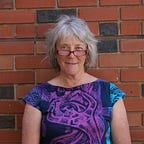Submission Guidelines
Changing the world for the better, one story at a time
What’s our publication about?
Fourth Wave is here to talk about women and other disempowered groups. We’re looking for pieces about how to make the world a better place, with an eye to reducing sexism, racism, homophobia and other blights, including environmental destruction. We also like a bit of fun, so send us your reviews, humor, fiction, and poetry on these themes.
Fourth Wave formed up on Medium on May 15, 2019. Help us to create an online space where women are respected, thinking is deep, and writing is strong. If you have a story idea and want some feedback, contact us at 4thWavesubmissions@gmail.com. If your story is ready to go, drop a link in our SUBMISSION FORM.
To learn how to get your story ready for publication, watch this video or read this Stylesheet.
Credit to the Artist
Our magnificent masthead was created by Leila Register. You can find her on Instagram.
You don’t have to be a Medium member to submit
If you don’t have a Medium account and don’t want to sign up for one, that’s okay. We can use our Fourth Wave Editors account to publish your work, with your byline as the subtitle. If your story makes $10 or more, we’ll send it to you via Venmo.
You don’t need an account and you don’t need to be a woman to submit. You only have to believe that all types of people are equal. Help us make the world a better place, one story at a time. Submit to the Wave!
Things to know about tags and other details
We currently have six categories for stories. Consider where your story fits best. When submitting a story, include a tag with that word so it will populate the right subpage. If you don’t include one of the tags listed below, we’ll add it so our site works correctly. What follows are the page headings and the tags that route to them.
World: World, Politics, Environment, Work, Election2020
Women: Women, Feminism, Love, Sex, Home
Media: Books, Movies, Music, Drama, Television, Events
Health: Health, Mental Health, Physical Health, Spirituality, Environment
Writing: Writing, Poetry, Fiction, Humor, Creative Non-Fiction, Memoir
San Francisco: San Francisco
Every story needs at least one graphic, horizontal is best, and you must credit the artist or link back to the source in the caption in order to be published in Fourth Wave. If you aren’t an artist yourself, look on Unsplash or Pixabay for photos that aren’t copyrighted.
We’ll do light copyediting for grammar, punctuation, or spelling. But if significant changes are wanted, we’ll ask you to make them.
If you provide your social media account names, we’ll link back to you when promoting your story on FB and Twitter. We’ll also add a section break and a line at the bottom of your story that asks readers to follow the publication.
Speaking of which…
We hope YOU will follow Fourth Wave to find your next good read, and remember to clap and comment for other writers on the site. Sisterhood is powerful, and a rising tide lifts all boats.
Why are we called Fourth Wave?
Fourth Wave is a feminist term. The banner of our publication is a visual representation of the four waves of the feminist movement.
Suffragettes created the First Wave of feminism which earned American women the right to vote in 1920 and focused on overturning legal barriers to gender inequality.
The Second Wave, represented by Gloria Steinem, came in the 1960s and ’70s and broadened the movement to include issues of sexuality, family, the workplace, and reproductive rights.
The Third Wave appeared in the 1990s, provoked by Anita Hill’s testimony about sexual harassment by Clarence Thomas during his confirmation hearings for the Supreme Court. The term is credited to Rebecca Walker (daughter of Pulitzer Prize winner Alice Walker) who used it in a piece about the hearings that was published in Steinem’s Ms. Magazine. That’s why both Hill and a portion of Walker’s piece represent the third wave on our banner. The Third Wave sought to redefine the term feminist, arguing for more individuality and diversity. Here’s a quote about it from Wikipedia:
The term third wave is credited to Rebecca Walker, who responded to Thomas’s appointment to the Supreme Court with an article in Ms. magazine, “Becoming the Third Wave” (1992).[9][1][6] She wrote:
So I write this as a plea to all women, especially women of my generation: Let Thomas’ confirmation serve to remind you, as it did me, that the fight is far from over. Let this dismissal of a woman’s experience move you to anger. Turn that outrage into political power. Do not vote for them unless they work for us. Do not have sex with them, do not break bread with them, do not nurture them if they don’t prioritize our freedom to control our bodies and our lives. I am not a post-feminism feminist. I am the Third Wave.[10][1]
The Fourth Wave is the era we are in today. It started around 2012 and focuses on empowering women using Internet tools. But the Fourth Wave isn’t just about gender. It builds on the concept of intersectionality introduced in the Third Wave, and recognizes how interlocking systems of power work together to keep all marginalized groups in check. The woman holding up the sign on our banner was protesting police mistreatment of women in Mexico. Her sign says, “They don’t protect me. They rape me.” These are the kinds of issues we want to discuss in this publication.
Please join us in making the world a better place, one reader at a time. Submit a story and/or follow Fourth Wave!
We hope to hear from you soon. But even if we don’t, keep writing!
Patsy Fergusson
Editor
Fourth Wave
